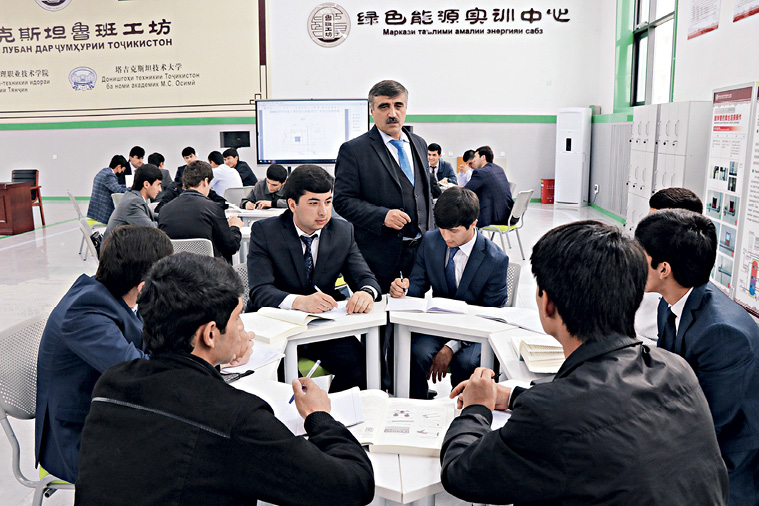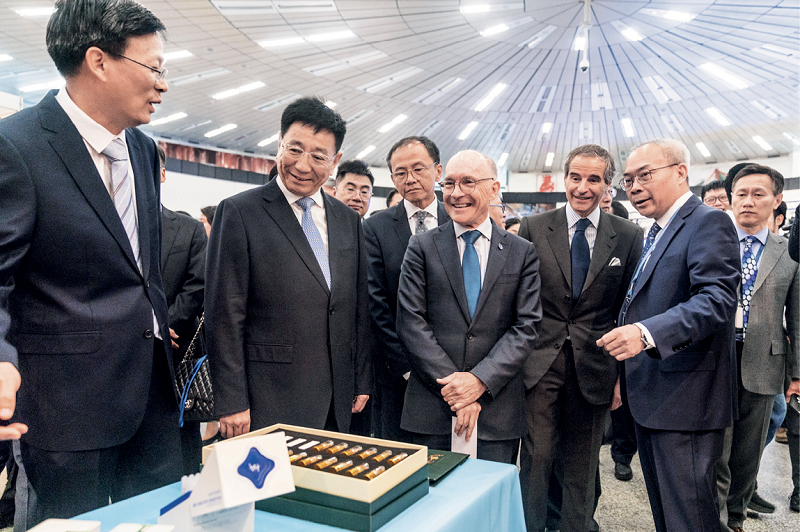
A Tajik teacher gives a lesson at the Luban Workshop in Dushanbe, Tajikistan, on April 17, 2023. The Luban Workshop, the first of its kind in Central Asia, co-founded by China’s Tianjin Urban Construction Management & Vocation Technology College and Tajik Technical University, was officially put into operation in November 2022.
Unlike elsewhere, there is no sensational news coming from China. There are no exploding gas pipelines, no shootings and no insecurity in the supply of energy and food. Inflation remains so low that it is amazing. Under the leadership of the Communist Party of China (CPC), China is showing the world what is possible. President Xi Jinping, heading the CPC since 2012, has led China’s transformation into one of the major global powers.
Today China is building a space station and the fastest trains; it is developing unmanned delivery services and providing thousands of practical artificial intelligence solutions. Medium-sized companies have grown alongside big corporations, which is an exception on a global scale. China is filing more and more patents and boasts top universities. Chinese films are finding international success, which is an important indicator of China’s growing cultural influence.
Even in times of crisis, China has been growing economically and remains a land of limitless possibilities.
What makes China’s economic reforms and geopolitical strategy so successful?
Chinese President Xi Jinping’s political program is clear and future-oriented: strengthening Party leadership, maintaining national unity and stability, and promoting the Chinese dream of national rejuvenation. Xi has also gained admiration for his sustained anti-corruption campaigns. He has promoted China’s growth with far-reaching economic reforms and increased national competitiveness. China’s pragmatic “dual circulation” strategy aims to reduce dependence on exports and investments while boosting domestic consumption demand, and build complete domestic supply chains while keeping the country open to the global market. Additionally, the focus is on high-quality products instead of the earlier mass production of cheap goods. Through targeted investments in key industries such as hi-tech, renewable energy and artificial intelligence (AI), China is becoming a world leader in innovation. It already boasts the two fastest computers in the world, Zuchongji 2.1 and Jiuzhang 2.0.

Themed on “Home of Confucius, Hub of the Belt and Road – A Real Story of the Global Civilization Initiative,” a key event of the 2023 UN Chinese Language Day, kicks off at the United Nations office in Vienna, Austria on May 2, 2023.
Blocs, Cold War, and unilateralism are no longer proving effective. States sanctioned and isolated by bloc politics are developing their own solutions, becoming increasingly independent in many areas and seeking new partners. BRICS and the Belt and Road Initiative are offering new options to the world alongside the established ones dominated by the Global North and gaining more participants.
In times of crisis and war, unity is the most important factor. But the world’s only super power, the United States, doesn’t want to bring the world together. Instead, it wants to dominate as a military power backed by the hegemony of the dollar. However, today more and more countries are seeking alternatives to U.S.-led alliances and the dollar.
President Xi is taking steps to fill the global responsibility gap. The Global Civilization Initiative (GCI) he proposed in March builds upon China’s three earlier initiatives, the Belt and Road Initiative, Global Security Initiative and Global Development Initiative. The GCI proposes joint advocacy in four aspects: jointly advocating respect for the diversity of civilizations, the common values of humanity, the importance of inheritance and innovation of civilizations, and people-to-people exchanges and cooperation. Through these efforts, China seeks stronger integration among nations and advocates for an open, inclusive and cooperative world order. The goal is to build a community with a shared future for mankind while recognizing diverse values, cultures and systems, and embracing both diversity and unity. China’s increased presence in global organizations like the United Nations underscores all of this.
Though critics argue that China is using such initiatives to advance its geopolitical interests and expand its influence over other nations,
China has not only successfully eradicated absolute poverty within its own borders, but also excelled in UN peacekeeping missions, provided assistance to other countries in times of need and supported long-term self-help efforts. China has advocated for multilateral approaches and amplified the voice of Africa.
Under Xi’s leadership, China has also delivered diplomatic solutions, gaining recognition as an effective mediator in the Middle East. Recently it also proposed a peace plan for Ukraine. From this perspective, it is a positive thing for world peace and stability if China gains more influence globally. In fact, the more states participate in the GCI, the less likely it is that individual states, including China itself, will dominate the world.

NILS BERGEMANN is a journalist, editor and communication expert. A former employee of China Media Group, he currently teaches German, linguistics and economics at the University of International Business and Economics in Beijing.